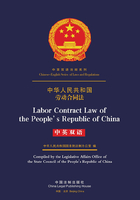
第一章 总则
Chapter I General Provisions
第一条 为了完善劳动合同制度,明确劳动合同双方当事人的权利和义务,保护劳动者的合法权益,构建和发展和谐稳定的劳动关系,制定本法。
Article 1 This Law is enacted in order to improve the labor contract system, define the rights and obligations of both parties to a labor contract, protect the legitimate rights and interests of workers, and establish and develop a harmonious and stable labor relationship.
第二条 中华人民共和国境内的企业、个体经济组织、民办非企业单位等组织(以下称用人单位)与劳动者建立劳动关系,订立、履行、变更、解除或者终止劳动合同,适用本法。
国家机关、事业单位、社会团体和与其建立劳动关系的劳动者,订立、履行、变更、解除或者终止劳动合同,依照本法执行。
Article 2 This Law is applicable where organizations such as enterprises, self-employed economic organizations and private non-enterprise units within the territory of the People's Republic of China (hereinafter referred to as employing units)establish labor relationships with workers through concluding, performing, modifying, revoking or terminating labor contracts with them.
State organs, institutions and public organizations and the workers with whom they are to establish labor relationships shall conclude, perform, modify, revoke or terminate labor contracts in accordance with this Law.
第三条 订立劳动合同,应当遵循合法、公平、平等自愿、协商一致、诚实信用的原则。
依法订立的劳动合同具有约束力,用人单位与劳动者应当履行劳动合同约定的义务。
Article 3 Labor contracts shall be concluded in adherence to the principles of lawfulness, fairness, equality, voluntariness, consensus through consultation, and good faith.
A labor contract concluded in accordance with law shall have binding force. Both the employing unit and the worker shall fulfill the obligations stipulated in the labor contract.
第四条 用人单位应当依法建立和完善劳动规章制度,保障劳动者享有劳动权利、履行劳动义务。
用人单位在制定、修改或者决定有关劳动报酬、工作时间、休息休假、劳动安全卫生、保险福利、职工培训、劳动纪律以及劳动定额管理等直接涉及劳动者切身利益的规章制度或者重大事项时,应当经职工代表大会或者全体职工讨论,提出方案和意见,与工会或者职工代表平等协商确定。
在规章制度和重大事项决定实施过程中,工会或者职工认为不适当的,有权向用人单位提出,通过协商予以修改完善。
用人单位应当将直接涉及劳动者切身利益的规章制度和重大事项决定公示,或者告知劳动者。
Article 4 Employing units shall establish and improve labor rules and regulations to ensure that workers enjoy the labor rights and fulfill the labor obligations.
When formulating or modifying the rules and regulations, or making decisions on important matters, which have a direct bearing on the immediate interests of workers, such as labor remuneration,working hours, rest and vacation, occupational safety and health, insurance and welfare, training, labor discipline and labor quota control, the employing unit shall, after discussion by the conference of workers or all the workers, put forward plans and suggestions and make decisions after consulting with the trade union or the representatives of the workers on an equal footing.
If, during the implementation of the rules and regulations or the decisions on important matters, the trade union or the workers hold that such rules, regulations or decisions are inappropriate, it or they are entitled to put forward the opinion to the employing unit, and have the rules, regulations or decisions modified and improved through consultation.
The employing unit shall make public or inform the workers of the rules and regulations, and the decisions on important matters, which have a direct bearing on the immediate interests of the workers.
第五条 县级以上人民政府劳动行政部门会同工会和企业方面代表,建立健全协调劳动关系三方机制,共同研究解决有关劳动关系的重大问题。
Article 5 The administrative department of labor of the people's government at or above the county level shall, together with the representatives of the trade union and the enterprise, establish a sound tripartite mechanism for coordination of labor relationships, in order to jointly discuss and resolve the major issues concerning labor relationships.
第六条 工会应当帮助、指导劳动者与用人单位依法订立和履行劳动合同,并与用人单位建立集体协商机制,维护劳动者的合法权益。
Article 6 The trade union shall give assistance and guidance to the workers in lawfully concluding labor contracts with the employing unit and performing the same, and establish a collective consultation mechanism with the employing unit in order to protect the legitimate rights and interests of workers.